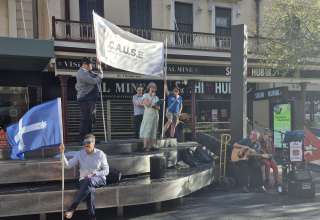 Mid-February saw the Federal and High Courts, at the behest of the Australian Building Construction Commission (ABCC) and the Turnball government, hand down two damaging decisions against the Construction Forestry Mining Energy Union (CFMEU). For carrying out industrial activity, such as union officers going onto building sites and organising strike action, which is normal union work the CFMEU has been hit with a $1 million penalty.
Mid-February saw the Federal and High Courts, at the behest of the Australian Building Construction Commission (ABCC) and the Turnball government, hand down two damaging decisions against the Construction Forestry Mining Energy Union (CFMEU). For carrying out industrial activity, such as union officers going onto building sites and organising strike action, which is normal union work the CFMEU has been hit with a $1 million penalty.
For ‘unlawful industrial behaviour’ the CFMEU has collected more than $12 million in fines over the last 6 years. In addition the High Court has ruled that the CFMEU can not pay union officers fines for carrying out normal union work or what is described by the court, as ‘unlawful behaviour’.
Joseph Myles was fined $18,000 by the Federal Court for stopping a concrete delivery to Melbourne’s Regional Rail Link site in 2013. The CFMEU appealed and won it’s case at the full bench of the Federal Court.Then the ABCC appealed this decision to the High Court, who found in favour of the ABCC and decided that Joseph Myles’ fine could not be paid by the CFMEU.
There has been a dramatic change in the handling of industrial relations over the years. The past practice saw disputes handled by industrial commissions and courts; now governments have legislated for criminal and corporate law to be used against unions and unionists.
Industrial action by unions is virtually illegal as a result of the current ABCC legislation, Competition and Consumer Act (CCA) and the Fair Work Act whose purpose is to incur enormous financial and gaol penalties for transgressors. The intention is to intimidate militancy out of unions with the threat of bankrupting unions and unionists, then finally throwing militants into gaol and deregistering ‘misbehaving’ unions.
The union movement must unite and develop grassroots links with their communities to oppose and fight these draconian industrial laws. Relying on the Australian Labor Party, parliament and the legal system is no solution, because it is these institutions that criminalised union action in the first place.
The article below came from the CFMEU
Published: 19 Feb 2018
ACCC running the Turnbull Government’s anti-union agenda
The CFMEU has accused the Australian Competition and Consumer Commission of running the Turnbull Government’s anti-union agenda instead of going after companies that are ripping people off.
The ACCC has pursued the union through the courts for over three years over so called secondary boycotts.
“The ACCC is meant to act in the interests of Australian consumers but it seems more interested in running the Turnbull Government’s anti-union agenda,” CFMEU National Construction Secretary Dave Noonan said.
“The big oil companies are gouging Australian motorists every long weekend when fuel prices go through the roof. And everyone who buys concert or sporting tickets online knows that the ticketing companies are gouging punters for so called booking fees.
“In the construction industry, small subbies are systematically screwed by the multinational builders and developers, yet the ACCC goes after unions and workers apparently under political direction of the Turnbull Government.”
The union has also criticized last week’s finding by the High Court that union a CFMEU official must personally pay penalties incurred in the course of his employment.
The High Court’s decision would have ramifications for other union officials and workers who don’t even hold office in a union.
“Not all laws are fair, and fines and penal provisions have never resolved industrial disputes.
“This demonstrates that the Court knows everything about black letter law but nothing about justice for working people.
“I look forward to the day when governments, regulators and courts make company directors personally liable for wage theft.
“It is clear the High Court would hold unions and workers to a different standard by enforcing personal payment of fines.
“Construction is one of the most dangerous industries in the country, and our organisers will not be intimidated from standing up for their member’s rights and safety.“




